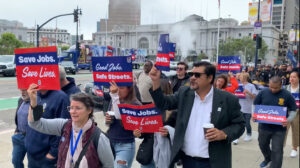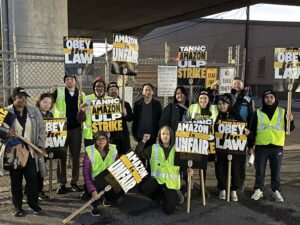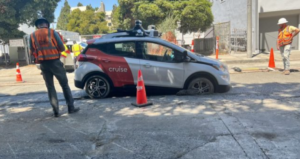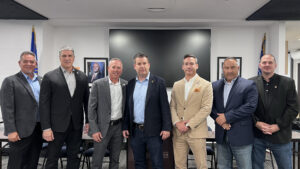Important legislation awaits Governor’s signature
September 15, 2022There is an old adage under the state’s capitol dome that nothing big happens in the Legislature during an election year. It appears that bit of wisdom no longer holds true, as we saw groundbreaking deal after groundbreaking deal take shape this summer culminating in potentially huge policy shifts sent to the Governor’s desk. Some of these include healthcare malpractice reform, new recycling requirements on single-use packaging, ambitious climate change and clean energy rules, measures to address mental health and addiction for the homeless, and bills designed to tackle the housing crisis.
Labor also scored big victories in the Legislature. We supported an effort by Fight for $15 and SEIU to get an important bill to improve the lives of fast food workers to the Governor’s desk. AB 257 by Assembly Member Holden (D, Los Angeles) creates a statewide council that will have the authority to set minimum workplace standards for fast food workers. The bill also creates joint liability for the parent corporations when their franchisees violate labor laws. The Governor signed the bill on Labor Day, but it may be put on hold as the fast food industry seek to qualify a referendum to overturn the law.
Our union also supported the efforts of the UFW to pass significant farm worker labor law reforms. AB 2183 by Assembly Member Stone (D, Santa Cruz) would, among other things, authorize card check for organizing any employer subject to the jurisdiction of the Agricultural Labor Relations Board. This could be a game-changer, not only for organizing in the fields but also in other ancillary industries regulated by the ALRB such as cannabis. At press time, the Governor has yet to act on the bill. He has signaled that he may veto it, but he is facing tremendous pressure from the union movement and high-profile individuals including President Biden.
CTPAC also sponsored a number of bills to address Teamster issues in a variety of industries. All of these made it to the Governor’s desk.
Prevailing wage for construction drivers
AB 1851 by Assembly Member Robert Rivas (D, Salinas) would clarify that California law requires the payment of prevailing wage for on-hauling of materials for paving, grading, and fill onto a public works construction site. This bill was in response to a California Supreme Court decision that threw the law into doubt and we needed to respond to ensure our members continued to get prevailing wage for this work. We are hopeful that the Governor signs the bill since we worked very hard to address the concerns of the industry and his own agency.
Database on waste haul franchises
AB 2048 by Assembly Member Miguel Santiago (D, Los Angeles) would create a state waste haul franchise agreement database so that all local franchise agreements for waste and recycling are easily accessible to the public. Having access to these agreements is critical for both organizing and holding on to our incumbent contracts. Currently, if we want to know what is in one of these franchise agreements, we have to do a public records request. This is costly and cumbersome given how many of these agreements are out there statewide. We moved the bill to the Governor’s desk with bipartisan support.
New vehicle technology
AB 2441 by Assembly Member Ash Kalra (D, San Jose) would make the introduction of new vehicle technology, including automation, that affects bargaining unit work in public transit a mandatory subject of collective bargaining. This bill, if signed, could be a model for job protection and creation as vehicle technology evolves.
Healthcare for strikers
AB 2530 by Assembly Member Jim Wood (D, Santa Rosa) would ensure that striking workers and their families do not lose their healthcare during a strike by making them immediately eligible for Covered California, paid for by the state. Public sector employers are already required to maintain employee health benefits during a strike, but that law doesn’t apply in the private sector. This bill, if signed, will protect all striking workers from having their healthcare weaponized against them.
Salary steps for CSU workers
SB 410 by Senator Connie Leyva (D, Chino) would require the California State University system to restore salary steps for their non-faculty workforce, including our skilled trades members. CSU eliminated salary steps decades ago and is currently the only state agency that does not provide them to their employees. This has created an ever-increasing wage gap between older employees and new hires. This inequity will be rectified if the Governor signs this very important measure.
Monetary penalties for unfair practices
SB 931, also by Senator Connie Leyva, would provide meaningful monetary penalties for unfair labor practices committed by a public sector employer. We have seen time and again, that public employers ignore the state mandate that they must be neutral when it comes to unions. This is particularly egregious at the University of California. Real penalties will hopefully make them think twice before engaging in anti-union behavior.
Worker rights in emergencies
Finally, SB 1044 by Senator Maria Elena Durazo (D, Los Angeles) would prevent an employer from restricting an employee’s ability to communicate with family or leave a dangerous worksite during emergency conditions. Workers, like the ones who perished in the Amazon warehouse during a tornado, should not be forced to put their lives on the line simply because the employer has no plan for emergencies or is too greedy to put the safety of employees first.
The Governor has until September 30 to either sign or veto these bills. We will be working hard until then to push for signature.





